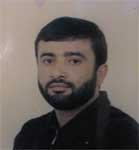
Date of birth: 20 September 1967
Place of residence: Dura village, south of Hebron.
Occupation: Nurse and ambulance officer. Ayed has been the deputy director of the Hebron Palestinian Red Crescent Society’s ambulance and emergency services since 1989.
Marital status: Married and father of six
Place of detention: Ketziot Prison
Postal address: Ketziot Prison, P.O. Box 13, Postal Code: 84102, Israel
Follow Ayed’s detention on ![]()
Ayed is the first case in Addameer’s new Prisoners at Risk campaign, launched on 17 April 2011, Palestinian Prisoners’ Day. The campaign will raise awareness of specific cases of Palestinian political prisoners whose detention presents serious dangers. For more information about this campaign, please visit the campaign webpage and Facebook ![]()
For more information on administrative detention, read Addameer’s report on administrative detention: